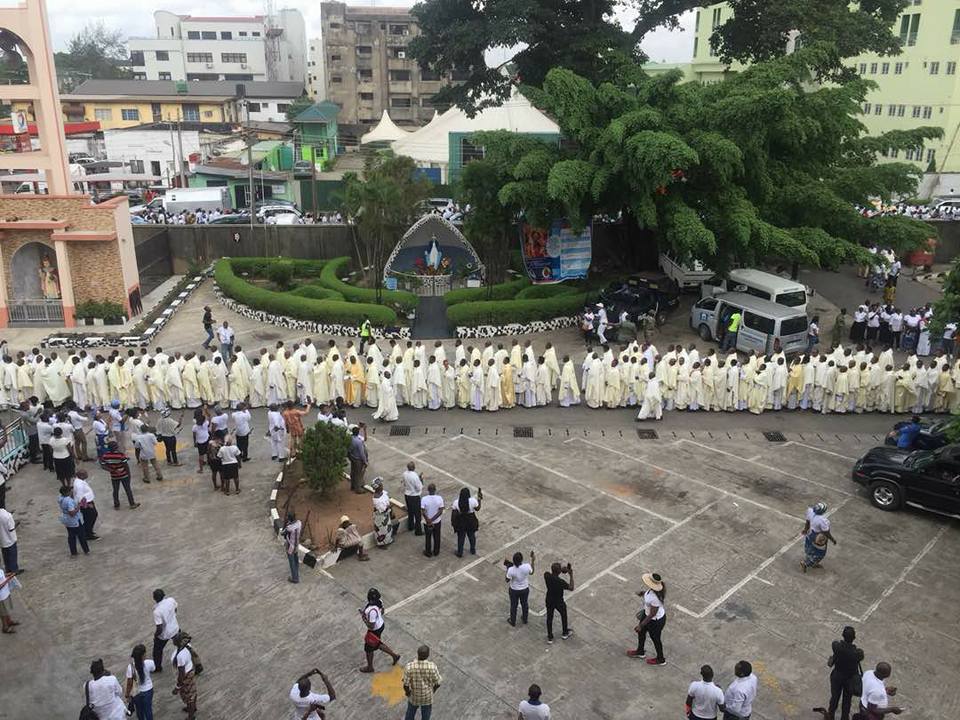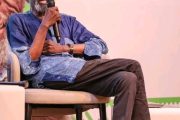There is now a distinctly Catholic voice and practice on the insecurity crisis in Nigeria. Until the procession across the country yesterday, this was not the case although individual and group voices of Catholics have been heard, now and then. An emergent Catholics theory and practice in response to contemporary insecurity in Nigeria is a complicated issue because Catholicism, one of the eight civilisations in Huntington’s schema, is about difference/diversity on a global scale and, therefore, an issue in global security to the extent that diversity defines security today.

Nigerian Catholic Bishops with the Pope
Now, the global and the local are indistinguishable in this case because an event that took place in Abuja, the Federal Capital city, Lagos, the commercial capital, symbolic capitals such as Ibadan and Enugu and far flung corners such as Benin, Minna, Uyo, Auchi, Yola, Lokoja, Warri, amongst others, is a serious early warning in national security, more so if it is by a distinct community as the Catholics. This complexity stretches far into faith because, if the voice of the people is the voice of God, then the spread of the procession cannot but be understood as God speaking to Nigeria and its centres of power.
It is interesting and elating that the Catholics have never called for violence, suggesting their interest in inter-subjective approach to threat management which violence would have foreclosed. This analysis is no more an academic claim after yesterday’s procession passed without any slight incidence of violence. Instead, some leaders of the Catholic establishment such as John Cardinal Onaiyekan were calling on Nigerians to transcend ethno-religious fault lines and retrieve Nigeria from drifting into anarchy, anarchy being the ultimate sort of chaos that every human group must work against. And the slogans, all socially critical but emphatically consensual on one Nigeria! All these speak to a contextually radical praxis as far as popular responses to the on-going impasse in Nigeria is concerned.
If the procession is an early warning sign, then the complication can be reduced to a security complication. What is security is, however, always a question of who is securing whom from what. It is not a technical, specialist or objective matter of spies and men under arms. Otherwise, the defunct USSR would not have suffered what the inheritors of the Soviet State came to call “the greatest tragedy of the 20th century” because it had the most proficient spies, commanders and fighter pilots. But the Soviet State, like the Roman Empire before it, collapsed without anyone firing a shot. Both empires collapsed in that manner because all societies in decay are vulnerable to such shocks, shocks which spies, commanders and fighter pilots are never ever able to make sense of because, like beauty, security is in the eye of the beholder. Security is not an objective practice but always one essentialism or the other.
 The implication of that as far as yesterday’s procession is concerned is for the Nigerian security establishment to transcend whatever its essentialist hook-up might be and open up the space for a dialogue on the spate of killings. In contemporary times, that is the only approach to conflict management that never fails because it provides space for the feelings of live human beings instead of paradigms and grand narratives produced by powerful people who neither have any experience of what is happening nor are disinterested parties to such crises. It means a better way to resolve the impasse of this magnitude is to allow for inter-discursive engagement with the threat at hand. It is a threat the solution to which must reflect the subjectivity of protest groups, religious and otherwise, in an open process that can re-assure all Nigerians in every corner of the country.
The implication of that as far as yesterday’s procession is concerned is for the Nigerian security establishment to transcend whatever its essentialist hook-up might be and open up the space for a dialogue on the spate of killings. In contemporary times, that is the only approach to conflict management that never fails because it provides space for the feelings of live human beings instead of paradigms and grand narratives produced by powerful people who neither have any experience of what is happening nor are disinterested parties to such crises. It means a better way to resolve the impasse of this magnitude is to allow for inter-discursive engagement with the threat at hand. It is a threat the solution to which must reflect the subjectivity of protest groups, religious and otherwise, in an open process that can re-assure all Nigerians in every corner of the country.
It is no use playing up any particular segment of Christianity and its entry point in a crisis situation but, in this context, the subjectivity of the Catholics has become a key factor, they being the chief mourners of the two priests who were killed as targeted victims in a spate of killings that has generated a siege unknown in the history of the country. That siege is not unconnected with this being the first time the Nigerian State looks incapable of framing a threat to state survival in a way satisfactory to all stakeholders, much less confronting the threat. Yet, it has the monopoly of not only legitimate use of force but even of discourse. The implications of such a state and situation must be frightening to everyone except those reading partisanship to it, either out of false sense of security or a famished threat analysis or just narcissism.
Above all, both those who are Catholics and those who are not and even non Christians listen to Catholicism because, as one of them argued recently, Catholic Humanism has always provided the world with a discourse of ‘security as emancipation’. That was Bishop Mathew Kukah speaking at the First National Conference of the Centre for Peace and Development of the Catholics’ own university – Veritas University, Abuja – in November 2017. It is such a weighty claim that would have been the subject of a lively debate if it had been made when Nigeria were still its ebullient liberal self. But the times are uninviting of such debates basically because security in its various dimensions is on leave in Nigeria. There is no human segment where the Catholics who assert the competence of its social teachings to serve humanity at every turn, before, during and after the Cold War can or should be ignored if peace is to be guaranteed.
It is still possible to really re-define Nigeria in a way which would excite all those who have perished in the current siege in their graves. But such would not come from essentialism. In moments of social impasse, essentialism is necessarily an invitation to more crisis because it is essentialism that created the atmosphere for the impasse in the first case.























